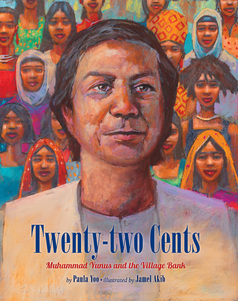 Paula Yoo is a children’s book writer, television writer, and freelance violinist living in
Paula Yoo is a children’s book writer, television writer, and freelance violinist living in![]() Los Angeles. Her latest book, Twenty-two Cents: Muhammad Yunus and the Village Bank, was released last month. Twenty-two Cents is about Muhammad Yunus, Nobel Peace Prize winner and founder of Grameen Bank. He founded Grameen Bank so people could borrow small amounts of money to start a job, and then pay back the bank without exorbitant interest charges. Over the next few years, Muhammad’s compassion and determination changed the lives of millions of people by loaning the equivalent of more than ten billion US dollars in micro-credit. This has also served to advocate and empower the poor, especially women, who often have limited options. In this post, we asked her to share advice on what’s she’s learned about banking, loans, and managing finances while writing Twenty-two Cents.
Los Angeles. Her latest book, Twenty-two Cents: Muhammad Yunus and the Village Bank, was released last month. Twenty-two Cents is about Muhammad Yunus, Nobel Peace Prize winner and founder of Grameen Bank. He founded Grameen Bank so people could borrow small amounts of money to start a job, and then pay back the bank without exorbitant interest charges. Over the next few years, Muhammad’s compassion and determination changed the lives of millions of people by loaning the equivalent of more than ten billion US dollars in micro-credit. This has also served to advocate and empower the poor, especially women, who often have limited options. In this post, we asked her to share advice on what’s she’s learned about banking, loans, and managing finances while writing Twenty-two Cents.
What are some reasons why someone might want to take out a loan? Why wouldn’t banks loan money to poor people in Bangladesh?
PAULA: People will take out a loan when they do not have enough money in their bank account to pay for a major purchase, like a car or a house. Sometimes, they will take out a loan because they need the money to help set up a business they are starting. Other times, loans are also used to help pay for major expenses, like unexpected hospital bills for a family member who is sick or big repairs on a house or car. But asking for a loan is a very complicated process because a person has to prove they can pay the loan back in a reasonable amount of time. A person’s financial history can affect whether or not they are approved for a loan. For many people who live below the poverty line, they are at a disadvantage because their financial history is very spotty. Banks may not trust them to pay the loan back on time.
In addition, most loans are given to people who are requesting a lot of money for a very expensive purchase like a house or a car. But sometimes a person only needs a small amount of money – for example, a few hundred dollars. This type of loan does not really exist because most people can afford to pay a few hundred dollars. But if you live below the poverty line, a hundred dollars can seem like a million dollars. Professor Yunus realized this when he met Sufiya Begum, a poor woman who only needed 22 cents to keep her business of making stools and mats profitable in her rural village. No bank would loan a few hundred dollars, or even 22 cents, to a woman living in a mud hut. This is what inspired Professor Yunus to come up with the concept of “microcredit” (also known as microfinancing and micro banking).
In TWENTY-TWO CENTS, microcredit is described as a loan with a low interest rate. What is a low interest rate compared to a high interest rate?
PAULA: When you borrow money from a bank, you have to pay the loan back with an interest rate. The interest rate is an additional amount of money that you now owe the bank on top of the original amount of money you borrowed. There are many complex math formulas involved with calculating what a fair and appropriate interest rate could be for a loan. The interest rate is also affected by outside factors such as inflation and unemployment. Although it would seem that a lower interest rate would be preferable to the borrower, it can be risky to the general economy. A low interest rate can create a potential “economic bubble” which could burst in the future and cause an economic “depression.” Interest rates are adjusted to make sure these problems do not happen. Which means that sometimes there are times when the interest rates are higher for borrowers than other times.
What is a loan shark?
PAULA: A loan shark is someone who offers loans to poor people at extremely high interest rates. This is also known as “predatory lending.” It can be illegal in several cases, especially when the loan shark uses blackmail or threats of violence to make sure a person pays back the loan by a certain deadline. Often people in desperate financial situations will go to a loan shark to help them out of a financial problem, only to realize later that the loan shark has made the problem worse, not better.
Did your parents explain how a bank works to you when you were a child? Or did you learn about it in school?
PAULA: I remember learning about how a bank works from elementary school and through those “Schoolhouse Rocks!” educational cartoons they would show on Saturday mornings. But overall, I would say I learned about banking as a high school student when I got my first minimum wage job at age 16 as a cashier at the Marshall’s department store. I learned how banking worked through a job and real life experience.
TWENTY-TWO CENTS is a story about economic innovation. Could you explain why Muhammad Yunus’s Grameen Bank was so innovative or revolutionary?
PAULA ANSWER: Muhammad Yunus’ theories on microcredit and microfinancing are revolutionary and innovative because they provided a practical solution on how banks can offer loans to poor people who do not have any financial security. By having women work together as a group to understand how the math behind the loan would work (along with other important concepts) and borrowing the loan as a group, Yunus’ unique idea gave banks the confidence to put their trust into these groups of women. The banks were able to loan the money with the full confidence in knowing that these women would be able to pay them back in a timely manner. The humanitarian aspect of Yunus’ economic theories were also quite revolutionary because it gave these poverty-stricken women a newfound sense of self-confidence. His theories worked to help break the cycle of poverty for these women as they were able to save money and finally become self-sufficient. The Nobel Committee praised Yunus’ microcredit theories for being one of the first steps towards eradicating poverty, stating, “Lasting peace cannot be achieved unless large population groups find ways in which to break out of poverty.”
 Twenty-two Cents: Muhammad Yunus and the Village Bank is a biography of 2006 Nobel Peace Prize winner Muhammad Yunus, who founded Grameen Bank and revolutionized global antipoverty efforts by developing the innovative economic concept of micro-lending.
Twenty-two Cents: Muhammad Yunus and the Village Bank is a biography of 2006 Nobel Peace Prize winner Muhammad Yunus, who founded Grameen Bank and revolutionized global antipoverty efforts by developing the innovative economic concept of micro-lending.









